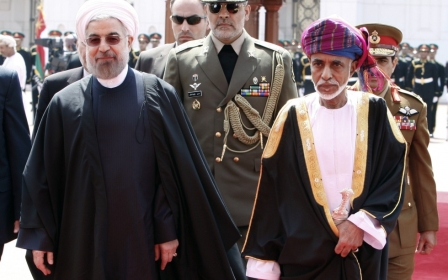Iran-Oman gas supply to be ready 'soon' despite no pipeline

Iran will “soon” begin supplying Oman with 20 million cubic metres of natural gas, marking the culmination of increasingly close ties between the two countries.
“Gas negotiations with Oman are over and as both sides have agreed, Iran will export 20 million cubic metres of gas per day to Oman in the near future,” Iranian Oil Minister Bijan Namdar Zanganeh said on Saturday.
The announcement comes in spite of the fact that a proposed 260km pipeline between the two countries has yet to be constructed, which could take almost 3 years to build.
Oman has suggested that half the gas transferred to the country will go to other markets such as Japan, South Korea and India.
In August 2013, Zanganeh and his Omani counterpart signed a ‘Memorandum of Understanding’ (MoU to help finalise the gas contract between the two sides.
Few countries are able to trade in oil or gas with Iran due to sanctions placed upon the country.
The effect of EU and US sanctions on Iran has been a near-halving of oil exports since 2013 from 2 million barrels to around 1.1 million barrels per day.
Iran-Oman relations stretch back many decades, even prior to the Islamic Revolution, with the former Shah of Iran providing the country military assistance to put down the communist Popular Front for the Liberation of Oman and the Gulf, who fought an insurgency against the Omani sultanate in the 60’s and 70’s.
The country’s adherence to the small Ibadi Islam sect - distinct from both the Sunni and Shia sect - has, some analysts argue, allowed the country to breach the Persian Gulf’s sectarian divide and reach out to Shia Iran.
Oman’s Sultan Qaboos bin Said al Said has been the longest ruling head of state in the Gulf, but his ailing health and failure to appoint a successor, combined with dwindling natural resources and increasing demonstrations against his centralised, authoritarian rule has left many concerned about the country’s future.
Writing in the New York Review of Books, Hugh Eakin said an Iranian nuclear deal could risk undermining the monopoly Oman enjoys on the trade of Iranian goods.
“Under the current sanctions against Iran, Oman has profited from a brisk commerce in contraband goods that originate in the United Arab Emirates and move through Oman’s Musandam peninsula, where they are ferried across the Strait of Hormuz to Iranian ports,” he wrote.
“If the sanctions end, this trade will abruptly decline. And with more Iranian oil on the world market, oil prices could drop, putting further pressure on the Omani budget.”
He also warned, however, that a failure of the nuclear talks would also prove a block on the gas trade.
“If there is no nuclear agreement, it is unlikely the gas pipeline with Iran—a potential lifeline as Omani reserves dry up—will ever get built.”
Stay informed with MEE's newsletters
Sign up to get the latest alerts, insights and analysis, starting with Turkey Unpacked
Middle East Eye delivers independent and unrivalled coverage and analysis of the Middle East, North Africa and beyond. To learn more about republishing this content and the associated fees, please fill out this form. More about MEE can be found here.




